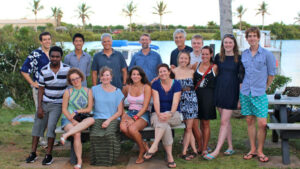Microbial Oceanography Course at BIOS Celebrates 15 Years

Since 1999 undergraduate and graduate students from around the world have traveled to BIOS each summer to participate in the Microbial Oceanography course. This three-week intensive course is co-taught by Dr. Craig Carlson (University of California, Santa Barbara), Dr. Stephen Giovannoni (Oregon State University), Dr. Craig Nelson (University of Hawaii), Rachel Parsons (BIOS), and Dr. John Heidelberg (University of Southern California), which provides students with a truly multidisciplinary learning experience that taps into the combined expertise of top scientists in their respective fields. This course has been made possible over the years with funding from BIOS, the National Science Foundation, Gordon and Betty Moore Foundation and the Agouron Institute.
This past summer, 12 students from universities in seven countries (including New Zealand, Ireland, Italy and Israel) took part in the course. These students represented a variety of educational levels—undergraduate, masters, and PhD—and backgrounds, with major areas of study including marine biology, aquatic biology, microbiology, and genetics. Their unifying characteristic was a desire to learn more about marine microbes which, although small in size, comprise more than 95% of the ocean’s living biomass and play significant roles in Earth’s biogeochemical cycles.
During the three weeks, students explore the physiology, life history, ecology, and genetics of marine microbes in traditional classroom lectures, and then take part in multiple field trips and laboratory experiments to investigate microbial processes in the open ocean and coral reef-dominated waters of Bermuda. These hands-on sessions allow students access to some of the tools and technologies currently utilized by microbial ecologists, including FISH (fluorescence in situ hybridization) microscopy, DNA extraction, and PCR (polymerase chain reaction).
Julie Matheson, graduate student in Biology at the University of Western Ontario, remarked, “This allowed me the opportunity to delve further into areas I found particularly interesting, under expert guidance. I hope to integrate the new techniques in my future studies.”
A highlight for many MO students is the opportunity to go to sea on a 24-hour sampling cruise aboard the R/V Atlantic Explorer. Audrey Ryan, a graduate student in Marine Biology at the University of Southampton (UK), said the cruise was “a snapshot of life at sea as a research scientist,” while another student commented that “the crew took us seriously and were super-ready to have us aboard.”
In summarizing his experience this summer, Tosin Obata, a PhD student originally from Nigeria and studying Marine Biology at the Scottish Marine Institute and University of Aberdeen, said, “By design and delivery of the course, they helped us to be able to work together as a team despite our diverse backgrounds. [The instructors] have succeeded in demystifying the whole thing about genomics and all the –omics. So many experts together in the same place, it’s amazing!”
Tim Burrell, a PhD student from New Zealand studying at the Victoria University of Wellington, personally emailed the instructors after the course and said “I think I speak for all the students when I say, not only did we learn practical research skills and techniques applicable to our future science careers, but we also had an amazing time getting to know the instructors and fellow students. It was a pleasure to attend M02013 and I really appreciate all the time and effort invested in each of us. It was an experience that I will never forget.”
